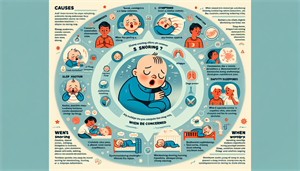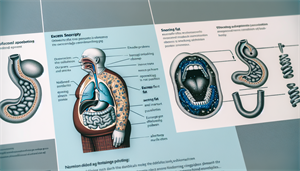
Do Babies Snore?
When your baby snores, it can spark concern. Baby snoring in infants can be normal, but there are times when it indicates a health issue. This article explains why babies snore, identifies potential causes, and highlights when medical advice is necessary.
Key Takeaways
Snoring in babies is common due to small airways and can be normal, but persistent, loud snoring may indicate underlying conditions like enlarged tonsils, adenoids, allergies, or sleep disorders such as sleep apnea.
Symptoms of sleep apnea in infants include difficulty breathing, frequent waking, recurring respiratory infections, and it should be promptly evaluated by a pediatrician due to potential long-term health effects.
While some snoring can be alleviated with home remedies, persistent or severe cases may require medical intervention including medication, surgery, or sleep studies for proper diagnosis and treatment.
Decoding the Whispers in the Crib: Unraveling Newborn Snoring
Newborn snoring, characterized by a raspy sound during sleep, is a common occurrence, with approximately 3% to 9% of infants snoring regularly by the age of 3 months.
This noisy breathing happens when the soft tissues in the throat become relaxed and obstruct the airway. While typical baby snoring does not warrant immediate concern, it could indicate certain underlying conditions that may necessitate medical evaluation in certain instances, especially if it affects the quality sleep of the baby.
Such potential underlying conditions could include laryngomalacia and other sleep disorders that are associated with snoring in infants.
The Symphony of Sleep: Normal Baby Noises
Snoring in babies is usually caused by their small and narrow breathing airways, which can fill with mucus and fluids. The petite nasal passages can lead to not only snoring but also whistling or snuffling sounds during sleep, and sometimes breathing slows down.
Occasional snoring in babies should not be immediately considered a cause for concern, particularly in newborns younger than 1 month old who may experience periods of fast breathing after momentarily stopping and do not exhibit changes in color or loud breathing during sleep. However, if you notice poor weight gain or other developmental issues, it’s important to consult a pediatrician.
When Snoring Suggests Something More: Identifying Abnormal Sounds
Persistent and loud snoring, which is not usual for infants, could signal a serious breathing problem during sleep.
For instance, obstructive sleep apnea (OSA) in infants is a condition characterized by the closure of the throat during breathing, leading to the production of a rough snoring sound.
Central sleep apnea, a type of sleep disorder, is an even more serious condition, as it is characterized by recurring periods of reduced or stopped breathing. This is often accompanied by a bluish tinge to the skin. Another condition to be alert about is laryngomalacia, a congenital condition that results in the collapse of the airway during inhalation, causing stridor or ‘noisy breathing’.
Pinpointing the Culprits Behind Your Child's Snoring
Frequent causes of snoring in children encompass enlarged tonsils, adenoids, allergies, and sleep apnea. If your child’s snoring appears to be excessive, these potential causes should be examined. Enlarged tonsils and adenoids can obstruct your baby’s airway, reducing airflow during sleep and thereby causing snoring.
Allergies can also play a part, causing inflammation in the nose and throat, leading to swelling of the nasal passages and resulting in snoring due to restricted airflow.
Tonsils and adenoids are specialized lymph glands situated at the posterior region of the nose and throat. When they become enlarged, they can obstruct the airway of a baby, reducing airflow during sleep and thereby causing snoring. Indeed, one might attribute


